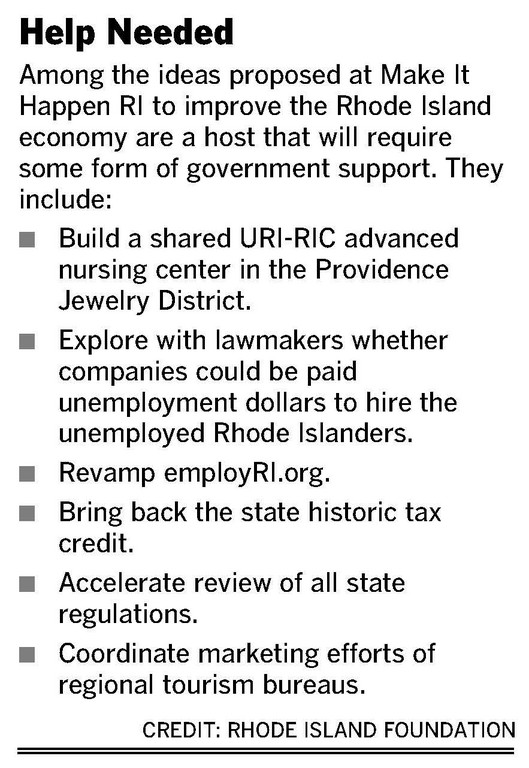Things have been happening in Rhode Island since The Rhode Island Foundation’s two-day private-sector intervention in the Ocean State economy brought together stakeholders in early September.
The Founders League, an entrepreneurial incubator to succeed the departed Rhode Island Center for Innovation Entrepreneurship incubator, was formed by Betaspring, the Greater Providence Chamber of Commerce, Brown University and the University of Rhode Island.
The Slater Technology Fund organized the first innovation showcase for dynamic Rhode Island companies to feature their technology to investors, an idea spawned in the foundation’s Make It Happen RI business-environment forum.
BRIdge.jobs, an online internship exchange run by the R.I. Student Loan Authority – supported by local colleges and funded partially by The Rhode Island Foundation – was launched in response to the repeated concerns that the state’s college students flee after graduation for lack of opportunity.
Leaders of medical-device and technology companies are meeting regularly in a group organized by Ximedica Chairman Stephen Lane to discuss how to grow that industry in the state.
And a new investment group called Ocean State Angels has formed from the life science sector to finance and mentor new seed and early-stage medical and biotech companies.
Some of these developments grew directly out of the Make It Happen discussions, while others were already in the works and would have happened anyway.
But regardless of where the ideas came from, The Rhode Island Foundation wants them to continue and last week committed $1 million for ideas proposed at Make It Happen, while releasing a progress report highlighting what has been done and what top priorities described by attendees remain.
“We have no doubt there still needs to be a sense of urgency,” said Rhode Island Foundation Executive Director Neil Steinberg. “Even though we see positive signs, everyone acknowledges the bleak situation and that we need a jump-start.”
Despite the list of notable recent accomplishments, there are many ideas that drew strong support from Make It Happen attendees but have yet to be acted on.
Access to capital has taken on even greater significance since the spring, when the R.I. Economic Development Corporation entered a period of retrenchment following the collapse of 38 Studios LLC.
Getting the largest nonprofits in the state to invest a small part of their endowments in a new, locally managed fund for Rhode Island enterprises was a popular idea in the job-creation forum that would improve local access to capital.
Providence Economic Development Director James Bennett, who came up with the idea and vowed to pursue the nonprofit money, could not be immediately reached for comment last week.
Another idea mentioned several times at the September forum and listed in the progress report was creation of a shared University of Rhode Island-Rhode Island College advanced nursing center. That plan will require a yet-elusive political solution.
Connecting unemployed Rhode Islanders with the employers who say they can’t find qualified workers was a major topic of Make It Happen that has already seen action from a public-private partnership, in the creation bRIdge.jobs.
But as the list of ideas in the progress report shows, a long-term solution could include more government action, such as revamping the R.I. Department of Labor and Training’s employRI.org website
Or creating a variation of the “Georgia Works” program where unemployment insurance pays for the jobless to work at a company for a period of time instead of remaining home until they find a permanent opening.
Other ideas in the Make It Happen progress report that require government action are:
• Accelerating the review of all state regulations now under way.
• Reinstating the state historic-tax-credit program.
Public-private partnerships were a recurring theme of Make It Happen. Two of the newest initiatives illustrate how private-sector players with a public component have moved quickly this fall.
After Brown University ended the Rhode Island Center for Innovation and Entrepreneurship last spring, four organizations with disparate structures, including Brown, have stepped in to replace it.
The Founders League will be hosted by Betaspring, a private startup accelerator with some public funding, with support from the public University of Rhode Island, the business-backed nonprofit Greater Providence Chamber of Commerce and private Brown.
The exact nature of the programs provided by the new Founders League is still being worked out and the official opening will be in December.
Just down the street in the former Jewelry District, the publicly financed Slater Technology Fund is featuring East Providence medical-device maker IlluminOss Medical in the first of what it expects will be many forums for investors to get to know Rhode Island innovators.
As it emerged in Make It Happen discussions, the idea was also described as a kind of science fair, but Slater is focusing on making more targeted connections with private capital.
Slater Managing Partner Richard Horan said future forums could involve multiple companies, but they are starting with one this time and are in the process of bringing in investors to attend.
IlluminOss just raised $28 million in venture capital from a group of high-powered life sciences investors, making it an attractive candidate to showcase.
In his opening remarks at Make It Happen, Steinberg called on community leaders to bring a sense of urgency to fixing Rhode Island’s economy that too often isn’t there.
A month later, he said he sees the urgency, but fears it could wane.
“[The urgency] is out there, but one of the reasons we put up the $1 million is to keep repeating that call for it,” Steinberg said. •
No posts to display
Sign in
Welcome! Log into your account
Forgot your password? Get help
Privacy Policy
Password recovery
Recover your password
A password will be e-mailed to you.











